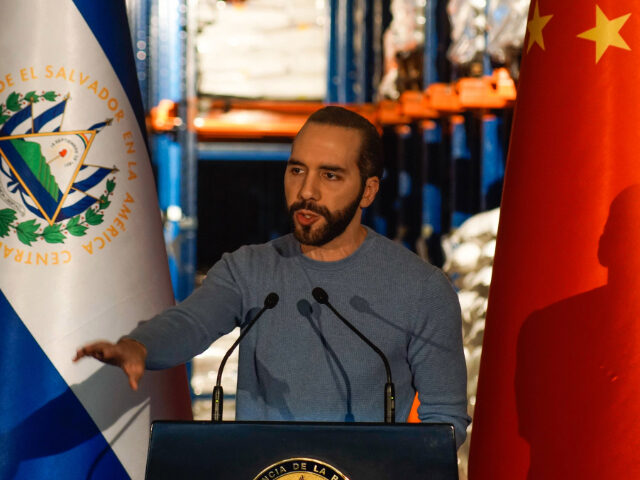Salvadoran Economy Minister María Luisa Hayem announced Tuesday evening the official start of El Salvador’s negotiations with communist China, intended to culminate with the signing of a Free Trade Agreement (FTA).
A Free Trade Agreement with China “as soon as possible” has been a goal of President Nayib Bukele’s since 2022, when China first expressed its willingness to begin negotiations to broker a trade deal with El Salvador after the Central American nation cut ties with the nation of Taiwan in favor of China.
“This is one of the most ambitious and comprehensive negotiations that El Salvador has undertaken in recent years,” Hayem said during a brief press conference.
Hayem stated that El Salvador hopes to broker an FTA with China that covers “issues such as intellectual property, services, investment, digital economy, and other areas that will boost our development.”
“We will work to prevent the existence of tariff barriers that prevent Salvadoran products from accessing the Chinese market,” she added, asserting that El Salvador finds itself in “the best moment” to reinforce its commercial and investment ties with a “strategic partner” such as China.
Chinese Vice Minister of Commerce Wang Shouwen expressed, on behalf of the communist nation, that he hoped both teams “can work together, understand and address each other’s concerns in order to sign the treaty as soon as possible.” Wang claimed that the prospective trade deal would be “comprehensive, modern and high-level.”
According to Wang, trade between China and El Salvador amounted to more than $1.8 billion in 2023, with the trade balance favoring China. El Salvador’s top exports to China are coffee and sugar.
“Our two economies most complement each other, the signing of a free trade agreement would help boost economic and trade cooperation, raise the quality and level of trade and investment,” Wang said.
El Salvador, during the administration of former President Salvador Sánchez Cerén, established ties with China shortly after cutting ties with Taiwan in 2018, effectively endorsing the Chinese Communist Party’s “One China Principle,” which claims that there is only one China in the world, and Taiwan is part of it.
At the time of breaking ties with Taiwan, El Salvador had an active Free Trade Agreement with Taiwan that went into effect in 2008. The agreement remained active in the following years thanks to a writ of protection granted by the Salvadoran courts to the nation’s Sugar Association in 2019, which allowed local sugar producers to continue exporting their products to Taiwan without paying tariffs. El Salvador’s Supreme Court of Justice ultimately ruled to suspend the agreement in November 2022. Taiwan ended the trade deal in May 2023.
After assuming the presidency in 2019, Bukele had El Salvador join China’s predatory Belt and Road Initiative (BRI) debt trap program. Bukele and his administration have received millions of dollars from China in infrastructure development programs, which Bukele has claimed are donations, not loans.
In February, Bukele inaugurated an “ultra-modern” national library in San Salvador, allegedly “gifted” by the Chinese communist government. Other Chinese infrastructure project “donations” include a national soccer stadium that began construction in December, a port in the municipality of La Libertad, and a water treatment plant in Lake Ilopango.
Bukele’s pro-China approach starkly contrasts his public stance regarding the communist regime before taking office.
In March 2019, Bukele, at a time when he was the president-elect of El Salvador, asserted that China “does not play by the rules, they do not respect the rules,” during an event held in Washington.
Bukele further accused China of developing “projects that are not feasible, leaving countries with huge debt that cannot be paid back and use that as financial leverage.”
“They are not a democracy, but they intervene in your democracy,” Bukele added.
Bukele’s comments sparked the outrage of the Chinese communist government. Beijing’s embassy in El Salvador claimed “China never looks to intervene in the internal affairs of other nations, but always opens and develops diplomatic relations with all countries, just as is the case with El Salvador.”
Christian K. Caruzo is a Venezuelan writer and documents life under socialism. You can follow him on Twitter here.

COMMENTS
Please let us know if you're having issues with commenting.